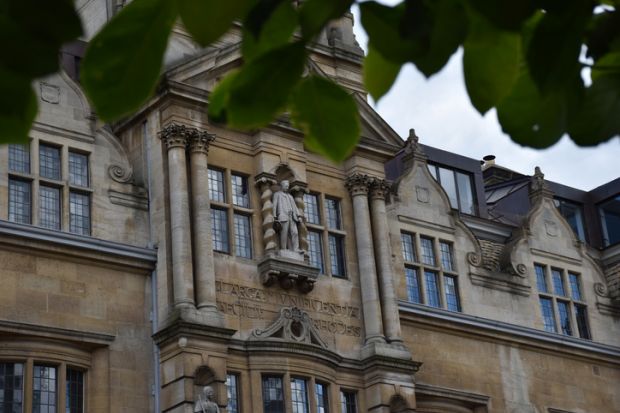A University of Oxford college has decided not to remove a statue of controversial Victorian imperialist Cecil Rhodes because of the “obstacles” involved, despite voting last year to take it down.
Oriel College said that following a report from an independent commission, it had “carefully considered the regulatory and financial challenges, including the expected time frame for removal”, and agreed “not to begin the legal process” of removing it.
Among the barriers noted by the commission had been “complex challenges” around the legal and planning process, including government policy to “retain and explain” contested statues and memorials, Oriel said.
Campaigners have been calling for years for the removal of the statue, which sits above a doorway to the college’s Rhodes Building, arguing that the 19th-century businessman and politician was a white supremacist.
After renewed protests last year, the governing body of Oriel voted in support of removing the statue and of launching an independent commission of inquiry into the key issues surrounding the monument.
Oriel said the commission had “backed the college’s original wish…to remove the statue, whilst acknowledging the complex challenges and costs presented by its removal in terms of heritage and planning consent”.
But it said the college’s governing body had “carefully considered the regulatory and financial challenges, including the expected time frame for removal, which could run into years with no certainty of outcome, together with the total cost of removal.
“In light of the considerable obstacles to removal, Oriel’s governing body has decided not to begin the legal process for relocation of the memorials.
“Instead, it is determined to focus its time and resources on delivering the report’s recommendations around the contextualisation of the college’s relationship with Rhodes, as well as improving educational equality, diversity and inclusion amongst its student cohort and academic community.”
It said additional measures would include establishing a tutor for equality, diversity and inclusion, raising money for new scholarships to support students from southern Africa and to provide “additional training for academic and non-academic staff in race awareness”.
“Funds equivalent to that remaining in the Rhodes legacy will be used to help resource these initiatives,” the college’s statement said.
It added that the commission, chaired by Carole Souter, the master of St Cross College, Oxford, “undertook a 10-month-long, detailed and rigorous, academic inquiry into the Rhodes legacy, together with a review of how the college’s 21st-century commitment to diversity can sit more easily with its past” and delivered its report earlier this month.
Oriel said the commission received more than 1,000 written submissions from students, alumni, associates of the college and the general public, with the “majority” of submissions backing the retention of the statue.
“Commission members supported the wish of the college’s governing body to remove the memorials but did not make specific recommendations on that issue – recognising that was a decision for the governing body of the college.”
Oriel said the report “acknowledged the considerable planning and heritage considerations involved in the removal of the statue” and the fact it would be “subject to legal and planning processes”.
“The commission noted that any application for planning permission to remove the memorials is not only likely to face considerable costs, but also complex challenges in the planning process, particularly since the government’s policy, in relation to historic statues and sites which have become contested, is to ‘retain and explain’ them.”
Lord Mendoza, provost of Oriel, said the issue of whether to remove the statue had been “a careful, finely balanced debate, and we are fully aware of the impact our decision is likely to have in the UK and further afield”.
“We understand this nuanced conclusion will be disappointing to some, but we are now focused on the delivery of practical actions aimed at improving outreach and the day-to-day experience of BME [black and minority ethnic] students,” he said.
“We are looking forward to working with Oxford City Council on a range of options for contextualisation.”
Register to continue
Why register?
- Registration is free and only takes a moment
- Once registered, you can read 3 articles a month
- Sign up for our newsletter
Subscribe
Or subscribe for unlimited access to:
- Unlimited access to news, views, insights & reviews
- Digital editions
- Digital access to THE’s university and college rankings analysis
Already registered or a current subscriber? Login







